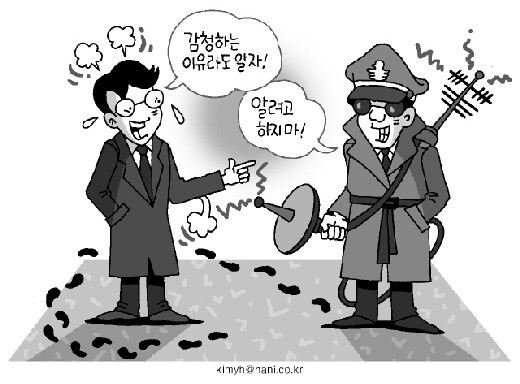hankyoreh
Links to other country sites 다른 나라 사이트 링크
NIS’s wiretaps jump fivefold in 8 years

The National Intelligence Service (NIS) is engaging in more wiretapping than before. Wiretaps are five times more than what they were eight years ago, and of all government wiretaps, those by the NIS accounted for 98.5 percent. Cases like these cause members of the public to suspect the NIS is abusing its power. This suspicion is leading to a growth of opposition to a bill to revise the Communications Secrecy Protection Act Tong Bi Beop, proposed by the administration of President Lee Myung-bak and his ruling Grand National Party (GNP), which would make it possible to intercept mobile phone and internet communications.
The Korea Communications Commission announced on April 7 that 3,379 wiretaps were preformed by intelligence and investigative agencies in the second half of last year, 8.8 percent more than for the same second half of 2007. During that period there were 254 landline wiretaps, a 27 percent increase, and 290 Internet use intercepts, an 11 percent decrease. The NIS was behind most wiretaps, 3,304 during that period, of which the police performed 50, the state prosecution performed 16, and military intelligence agencies were responsible for 9.
Wiretaps by the NIS are increasing the fastest. In 2008 it performed 8,867 wiretaps which has jumped fivefold from 1,575 wiretaps in 2000. In 2000 the NIS was the agency behind 44.5 percent of all wiretaps done by government agencies, but last year its wiretaps accounted for 98.5 percent.
According to a document, obtained by the Hankyoreh, which recorded the number of times in January of both 2008 and 2009 a major internet portal site company cooperated with the NIS on wiretapping, the NIS has asked for access to internet activity logs based on authorization from provincial or regional district courts. The law currently requires authorization from a top judge at a high court (godeung beobwon) before listening in on the communications of South Korean nationals. Electronic eavesdropping on foreign nationals deemed to be engaged in activity harmful to the country requires authorization from the president.
“The NIS is making use of the fact that only it knows whether the target is South Korean or a foreigner, and I suspect it is abusing the system,” said Lee Choon-suk of the Democratic Party.
The amendment proposed by the Lee administration and the GNP would allow the NIS to eavesdrop on foreign nationals directly and require service providers to install equipment that would make it possible for the NIS to perform wiretaps with greater ease. The administration and ruling GNP plan to have the legislation passed in April’s extraordinary session of the National assembly.
The People‘s Solidarity for Participatory Democracy, the Jinbo Network Center, and other “information rights”-related civic groups have joined together in an umbrella organization in opposition to revising the law. The umbrella organization, called “Organization for countermeasure against the NIS” (Gukjeongwon Dae’eung Moim) held a press conference in front of the National Assembly April 7. “Right now our society is in a crisis as it faces the rebirth of a NIS that has unlimited and unchecked power,” said the group in a written statement.
The information rights civic groups also said, “If the bill to revise the Communications Secrecy Protection Act is passed as currently proposed by the ruling party, communications eavesdropping will become the hands and feet of the NIS, and will function as a totalitarian tool to watch over people.”
Please direct questions or comments to [englishhani@hani.co.kr]
Editorial・opinion
![[Editorial] Penalties for airing allegations against Korea’s first lady endanger free press [Editorial] Penalties for airing allegations against Korea’s first lady endanger free press](https://flexible.img.hani.co.kr/flexible/normal/500/300/imgdb/original/2024/0502/1817146398095106.jpg) [Editorial] Penalties for airing allegations against Korea’s first lady endanger free press
[Editorial] Penalties for airing allegations against Korea’s first lady endanger free press![[Editorial] Yoon must halt procurement of SM-3 interceptor missiles [Editorial] Yoon must halt procurement of SM-3 interceptor missiles](https://flexible.img.hani.co.kr/flexible/normal/500/300/imgdb/child/2024/0501/17145495551605_1717145495195344.jpg) [Editorial] Yoon must halt procurement of SM-3 interceptor missiles
[Editorial] Yoon must halt procurement of SM-3 interceptor missiles- [Guest essay] Maybe Korea’s rapid population decline is an opportunity, not a crisis
- [Column] Can Yoon steer diplomacy with Russia, China back on track?
- [Column] Season 2 of special prosecutor probe may be coming to Korea soon
- [Column] Park Geun-hye déjà vu in Yoon Suk-yeol
- [Editorial] New weight of N. Korea’s nuclear threats makes dialogue all the more urgent
- [Guest essay] The real reason Korea’s new right wants to dub Rhee a founding father
- [Column] ‘Choson’: Is it time we start referring to N. Korea in its own terms?
- [Editorial] Japan’s rewriting of history with Korea has gone too far
Most viewed articles
- 160% of young Koreans see no need to have kids after marriage
- 2Presidential office warns of veto in response to opposition passing special counsel probe act
- 3[Editorial] Penalties for airing allegations against Korea’s first lady endanger free press
- 4Months and months of overdue wages are pushing migrant workers in Korea into debt
- 5Anti-immigration candidate marauds across Korea with squad detaining foreigners
- 6Hybe-Ador dispute shines light on pervasive issues behind K-pop’s tidy facade
- 7[Reporter’s notebook] In Min’s world, she’s the artist — and NewJeans is her art
- 8Inside the law for a special counsel probe over a Korean Marine’s death
- 9Japan says it’s not pressuring Naver to sell Line, but Korean insiders say otherwise
- 10Alleged drug use by Korean A-listers rocks nation – but not for the first time